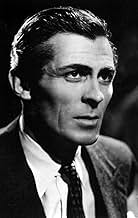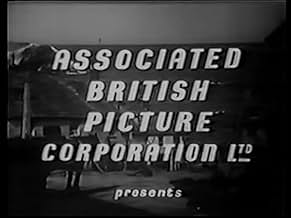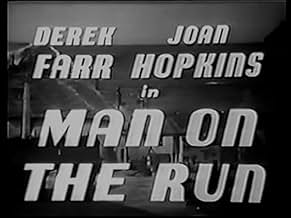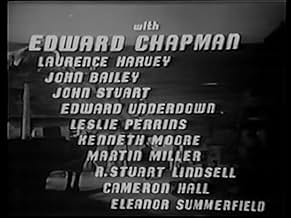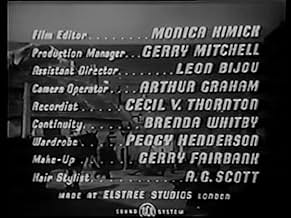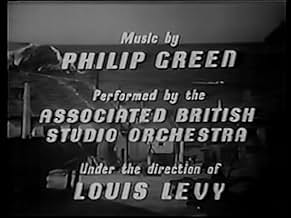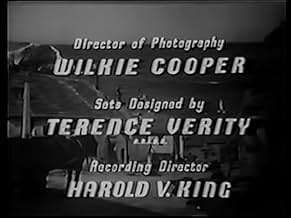IMDb RATING
6.7/10
512
YOUR RATING
In post-war Britain, an army deserter unwittingly gets involved in murder and armed robbery and enlists the aid of a war widow to help clear his name.In post-war Britain, an army deserter unwittingly gets involved in murder and armed robbery and enlists the aid of a war widow to help clear his name.In post-war Britain, an army deserter unwittingly gets involved in murder and armed robbery and enlists the aid of a war widow to help clear his name.
Howard Marion-Crawford
- 1st Paratrooper
- (as Howard Marion Crawford)
Kenneth More
- Corporal Newman
- (as Kenneth Moore)
Martin Miller
- Cafe Proprietor
- (as Martyn Miller)
- Director
- Writer
- All cast & crew
- Production, box office & more at IMDbPro
Featured reviews
This is the one and only movie I saw (and I saw many) tackling the theme of deserters. Main character Peter is one of them, a guy who used to be a good soldier but felt compelled to run AWOL after four years of war because his father died in a raid and his mother and sister needed his presence.
Peter is working as a bartender in a remote corner of England when an ex-comrade happens to pass by and tries to blackmail him. Peter moves to London, where life is difficult and expensive, and while trying to pawn his weapon he gets involved in an attempted robbery. He's only a witness but the police are chasing him.
Attractive widow Jean comes to his help and the plot develops nicely, albeit in a slightly forced way towards a suitable ending. The interesting part is the perspective of deserters, considered both from a negative and less negative point of view and just for that, the movie deserves some extra points.
Peter is working as a bartender in a remote corner of England when an ex-comrade happens to pass by and tries to blackmail him. Peter moves to London, where life is difficult and expensive, and while trying to pawn his weapon he gets involved in an attempted robbery. He's only a witness but the police are chasing him.
Attractive widow Jean comes to his help and the plot develops nicely, albeit in a slightly forced way towards a suitable ending. The interesting part is the perspective of deserters, considered both from a negative and less negative point of view and just for that, the movie deserves some extra points.
Derek Farr deserted from the British Army after four years of service and went underground. Now he is at the end of his rope, so he takes his service revolver to a pawn shop.... to pawn it. While he's standing there, two other men enter, knock out the owner and flee, killing a bobby as they go. Now Farr is really being pursued and he randomly stops Joan Hopkins... who agrees to help him.
There are definite noir elements in this movie, with discussion the estimated 20,000 deserters and some grimy cinematography by DP Wilkie Cooper, but that's about the limits of it. Otherwise, writer-director Lawrence Huntington has turned out a reasonably taut man-accused movie. Despite a decent story, the movie itself is curiously inert, with a lot of talk and not much movement.
Farr is clearly not wearing his hairpiece for this movie, an odd choice for a romantic lead type, but that, I suppose, it part of the noir aspect of it. Watch out for Laurence Harvey in his second screen appearance, playing a detective. He's only mildly creepy in this one.
There are definite noir elements in this movie, with discussion the estimated 20,000 deserters and some grimy cinematography by DP Wilkie Cooper, but that's about the limits of it. Otherwise, writer-director Lawrence Huntington has turned out a reasonably taut man-accused movie. Despite a decent story, the movie itself is curiously inert, with a lot of talk and not much movement.
Farr is clearly not wearing his hairpiece for this movie, an odd choice for a romantic lead type, but that, I suppose, it part of the noir aspect of it. Watch out for Laurence Harvey in his second screen appearance, playing a detective. He's only mildly creepy in this one.
10clanciai
What you will remember of this film is the local atmosphere from the post war London with its rather weary aspect both in people and their minds and the shaggy streets, ultimately leading you down to old Wapping with one of the most genuine pub atmospheres found in any film, but there is a long way to go before that.
You will also remember the difficult case of 20,000 deserters after the war, many of them turning to criminality for having no other choice. That's the clinch in which our hero finds himself, when a burglary takes place the moment he is trying to pawn his old gun without bullets, the two robbers in desperation shooting both the clerk and, when on the run, a policeman fatally - the first casualty in the film. The clerk recovers and gives a description of our hero, whom he saw, while the two burglars were masked. So our hero finds himself wanted for murder. Could you get into any deeper sea of trouble?
It's also memorable for the fine performance by Joan Hopkins, who plays a widow who believes in our hero's innocence, Kenneth More has a small part in the beginning, which turns out fatal for our hero on a constant run, and Laurence Harvey is a policeman - neither is sympathetic. Derek Farr plays our hero convincingly enough, a completely ordinary man with an inordinate amount of bad luck, having lost practically all his family in the war. It's a sad story but well made, and the beautiful music adds some extra romantic and melancholy charm to it. In spite of the poor technical quality, I must give it almost a full score for its interesting story of an eloquent script, fluent tempo and excellent cinematography.
You will also remember the difficult case of 20,000 deserters after the war, many of them turning to criminality for having no other choice. That's the clinch in which our hero finds himself, when a burglary takes place the moment he is trying to pawn his old gun without bullets, the two robbers in desperation shooting both the clerk and, when on the run, a policeman fatally - the first casualty in the film. The clerk recovers and gives a description of our hero, whom he saw, while the two burglars were masked. So our hero finds himself wanted for murder. Could you get into any deeper sea of trouble?
It's also memorable for the fine performance by Joan Hopkins, who plays a widow who believes in our hero's innocence, Kenneth More has a small part in the beginning, which turns out fatal for our hero on a constant run, and Laurence Harvey is a policeman - neither is sympathetic. Derek Farr plays our hero convincingly enough, a completely ordinary man with an inordinate amount of bad luck, having lost practically all his family in the war. It's a sad story but well made, and the beautiful music adds some extra romantic and melancholy charm to it. In spite of the poor technical quality, I must give it almost a full score for its interesting story of an eloquent script, fluent tempo and excellent cinematography.
Most enjoyable and fast moving film from Lawrence Huntington in an amazingly crisp and clear Blu-ray print. Not incredibly original story as the title may suggest but the twist here is the background of some 20,000 deserters in the UK desperately trying to evade capture and survive on the fringe of society. Wonderful location shooting on the edge of Soho, Seven Dials and Mayfair plus some unbelievably effective set design and not forgetting the village of Corfe Castle at the start. When we shift to Wapping the pub interior is so authentic I am trying to work out just which one it is but its all done in the studio, fantastic job. Performances are fine, some of us groan when we see Kenneth More at the start, in one of his earlier films, but he is only a bit part as is Alfie Bass who we see for about two seconds. It is Derek Farr and Joan Hopkins who play the leads, perfectly adequately and more to the point convincingly and fortunatley a young Laurence Harvey doesn't have too much to do. A great watch and makes one wonder how many other gems there might be of this period.
The great shame of unused female actors in British cinema is far too long; Joan Greenwood was an example, and rarely given roles that were truly worthy of her. Joan Hopkins is another and even less well known than Greenwood or many others. A pity because she had a statuesque beauty, and a quiet charm and in some shots her beauty almost rivals Greta Garbo. Opposite Derek Farr there is good chemistry, and for once she is pivotal to the film and not only decoration. Farr is a deserter from WW2 and on the run not only for that, but for a murder he is suspected of committing. Hopkins takes him into her flat and the two fall in love. I liked too the atmosphere of the UK after the war, with its turmoil at getting back to a previous life that will never come again. A fluctuating chaos that lasted through the late 1940's and the mid to late 1950's. The film is rich on detail, and there is Kenneth More as a war veteran in a small but significant role. Well directed,, and in the main well acted, it is worthy of hunting down for all those interested in this period of history, and the run down houses peeling with damp and cold bear no resemblance to the wealth there today. These films are essential to UK history and the passing of times, and the poverty and wealth that goes with it. And Joan Hopkins is quite simply excellent.
Did you know
- TriviaThe dialogue includes several clear uses of "basket" as a minced oath for "bastard". However the film was given an 'A' certificate (for "Adult Audiences") by the British Board of Film Censors, because of the depiction of an armed robbery.
- GoofsKenneth More is listed as Kenneth Moore in the opening credits but is listed correctly in the closing credits.
- Quotes
Sgt. Peter Burden, alias Brown: Well, do you believe any of this, or am I just wasting my time?
Details
- Runtime1 hour 22 minutes
- Color
- Aspect ratio
- 1.37 : 1
Contribute to this page
Suggest an edit or add missing content


